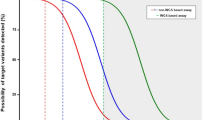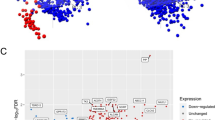Abstract
Purpose
Genetic variants in genes involved in the distribution, metabolism, accumulation or repair of lesions are likely to influence the response of drugs used in the treatment of Head and Neck Cancer (HNC). We examine the effect of 36 SNPs on clinical outcomes in patients with locally advanced HNC who were receiving platinum-based chemoradiotherapy (CRT).
Methods
These SNPs were genotyped in 110 patients using the iPLEX Gold assay on the MassARRAY method in blood DNA samples and used Kaplan–Meier and Cox regression analyses to compare genotype groups with the survival.
Results
Two SNPs, rs717620 (ABCC2) and rs12934241 (MMP2) were strongly associated with overall survival (OS) and disease-free survival (DFS). At a median follow-up of 64.4 months, the allele A of rs717620 (ABCC2) had an increased risk of disease progression {hazard ratio [HR] = 1.79, p = 0.0018} and death (HR = 2.0, p = 0.00027). ABCC2 was associated with OS after a Bonferroni adjustment for multiple testing. The MMP2 rs12934241‐T allele was associated with an increased risk of worse OS and DFS (p = 0.0098 and p = 0.0015, respectively). One SNP of ABCB1 and three SNPs located in the ERCC2 gene showed an association with response in the subgroup of HNC patients treated with definitive CRT.
Conclusions
Our findings highlight the potential usefulness of SNPs in different genes involved in drug metabolism and repair DNA to predict the response and survival to CRT. ABCC2 is a potential predictor of OS in patients with HNC.



Similar content being viewed by others
References
Bray F, Ferlay JSI, Soerjomataram I et al (2018) Global cancer statistic 2018: GLOBOCAN estimates of incidence and mortality worldwide for 36 cancers in 185 countries. CA Cancer J Clin 68(6):394–424
Ferlay J, Colombet M, Soerjomataram I et al (2019) Estimating the global cancer incidence and mortality in 2018: GLOBOCAN sources and methods. Int J Cancer 144:1941–1953
Pignon JP, le Maitre A, Maillard E, Bourhis J, Group M-NC (2009) Meta-analysis of chemotherapy in head and neck cancer (MACH-NC): an update on 93 randomised trials and 17,346 patients. Radiother Oncol 92(1):4–14
Terek MC, Zekioglu O, Sendag F, Akercan F, Ozsaran A, Erhan Y (2003) MDR1 gene expression in endometrial carcinoma. Int J Gynecol Cancer 13(5):673–677
Leonessa F, Clarke R (2003) ATP binding cassette transporters and drug resistance in breast cancer. Endocr Relat Cancer 10(1):43–73
Ford BN, Ruttan CC, Kyle VL, Brackley ME, Glickman BW (2000) Identification of single nucleotide polymorphisms in human DNA repair genes. Carcinogenesis 21(11):1977–1981
Goode EL, Ulrich CM, Potter JD (2002) Polymorphisms in DNA repair genes and associations with cancer risk. Cancer Epidemiol Biomarkers Prev 11(12):1513–1530
Willers H, Dahm-Daphi J, Powell SN (2004) Repair of radiation damage to DNA. Br J Cancer 90(7):1297–1301
Parliament MB, Murray D (2010) Single nucleotide polymorphisms of DNA repair genes as predictors of radioresponse. Semin Radiat Oncol 20(4):232–240
Duran G, Aguin S, Cruz R, Barros F, Giraldez JM, Bernardez B et al (2019) Association of GSTP1 and ERCC1 polymorphisms with toxicity in locally advanced head and neck cancer platinum-based chemoradiotherapy treatment. Head Neck 41(8):2704–2715
Moore JH, Gilbert JC, Tsai CT, Chiang FT, Holden T, Barney N et al (2006) A flexible computational framework for detecting, characterizing, and interpreting statistical patterns of epistasis in genetic studies of human disease susceptibility. J Theor Biol 241(2):252–261
Han B, Gao G, Wu W, Gao Z, Zhao X, Li L et al (2011) Association of ABCC2 polymorphisms with platinum-based chemotherapy response and severe toxicity in non-small cell lung cancer patients. Lung Cancer 72(2):238–243
Campa D, Muller P, Edler L, Knoefel L, Barale R, Heussel CP et al (2012) A comprehensive study of polymorphisms in ABCB1, ABCC2 and ABCG2 and lung cancer chemotherapy response and prognosis. Int J Cancer 131(12):2920–2928
Wei HB, Lu XS, Shang LH, Xu G, Hu J, Che DH et al (2011) Polymorphisms of ERCC1 C118T/C8092A and MDR1 C3435T predict outcome of platinum-based chemotherapies in advanced non-small cell lung cancer: a meta-analysis. Arch Med Res 42(5):412–420
Yin JY, Huang Q, Zhao YC, Zhou HH, Liu ZQ (2012) Meta-analysis on pharmacogenetics of platinum-based chemotherapy in non small cell lung cancer (NSCLC) patients. PLoS ONE 7(6):e38150
Zhang C, Li C, Zhu M, Zhang Q, Xie Z, Niu G et al (2013) Meta-analysis of MMP2, MMP3, and MMP9 promoter polymorphisms and head and neck cancer risk. PLoS ONE 8(4):e62023
Pietruszewska W, Bojanowska-Pozniak K, Kobos J (2016) Matrix metalloproteinases MMP1, MMP2, MMP9 and their tissue inhibitors TIMP1, TIMP2, TIMP3 in head and neck cancer: an immunohistochemical study. Otolaryngol Pol 70(3):32–43
Zhao X, Wang X, Wu W, Gao Z, Wu J, Garfield DH et al (2012) Matrix metalloproteinase-2 polymorphisms and clinical outcome of Chinese patients with nonsmall cell lung cancer treated with first-line, platinum-based chemotherapy. Cancer 118(14):3587–3598
Gonzalez-Arriaga P, Pascual T, Garcia-Alvarez A, Fernandez-Somoano A, Lopez-Cima MF, Tardon A (2012) Genetic polymorphisms in MMP 2, 9 and 3 genes modify lung cancer risk and survival. BMC Cancer 12:121
Yang Y, Xian L (2014) The association between the ERCC1/2 polymorphisms and the clinical outcomes of the platinum-based chemotherapy in non-small cell lung cancer (NSCLC): a systematic review and meta-analysis. Tumour Biol 35(4):2905–2921
Wu W, Li H, Wang H, Zhao X, Gao Z, Qiao R et al (2012) Effect of polymorphisms in XPD on clinical outcomes of platinum-based chemotherapy for Chinese non-small cell lung cancer patients. PLoS ONE 7(3):e33200
Quintela-Fandino M, Hitt R, Medina PP, Gamarra S, Manso L, Cortes-Funes H et al (2006) DNA-repair gene polymorphisms predict favorable clinical outcome among patients with advanced squamous cell carcinoma of the head and neck treated with cisplatin-based induction chemotherapy. J Clin Oncol 24(26):4333–4339
Park DJ, Stoehlmacher J, Zhang W, Tsao-Wei DD, Groshen S, Lenz HJ (2001) A Xeroderma pigmentosum group D gene polymorphism predicts clinical outcome to platinum-based chemotherapy in patients with advanced colorectal cancer. Cancer Res 61(24):8654–8658
Tibaldi C, Giovannetti E, Vasile E, Mey V, Laan AC, Nannizzi S et al (2008) Correlation of CDA, ERCC1, and XPD polymorphisms with response and survival in gemcitabine/cisplatin-treated advanced non-small cell lung cancer patients. Clin Cancer Res 14(6):1797–1803
Zhou M, Ding YJ, Feng Y, Zhang QR, Xiang Y, Wan HY (2014) Association of xeroderma pigmentosum group D (Asp312Asn, Lys751Gln) and cytidine deaminase (Lys27Gln, Ala70Thr) polymorphisms with outcome in Chinese non-small cell lung cancer patients treated with cisplatin-gemcitabine. Genet Mol Res 13(2):3310–3318
Ryu JS, Hong YC, Han HS, Lee JE, Kim S, Park YM et al (2004) Association between polymorphisms of ERCC1 and XPD and survival in non-small-cell lung cancer patients treated with cisplatin combination chemotherapy. Lung Cancer 44(3):311–316
Qixing M, Gaochao D, Wenjie X, Rong Y, Feng J, Lin X et al (2015) Predictive value of Ercc1 and Xpd polymorphisms for clinical outcomes of patients receiving neoadjuvant therapy: a prisma-compliant meta-analysis. Medicine (Baltimore) 94(39):e1593
Lu J, Zhao H, Li S, Tian Z, Zhu X, Wang H et al (2015) Correlation of rs1799793 polymorphism in ERCC2 and the clinical response to platinum-based chemotherapy in patients with triple negative breast cancer. Int J Clin Exp Med 8(2):2934–2938
Li F, Xie X, Ren X, Zhang J (2016) A meta-analysis identifies ERCC1 gene polymorphism as a predictor of better patient response to treatment with radiochemotherapy. Cancer Chemother Pharmacol 77(6):1183–1191
Bišof V, Zajc Petranović M, Rakušić Z, Samardžić KR, Juretić A (2016) The prognostic and predictive value of excision repair cross-complementation group 1 (ERCC1) protein in 1288 patients with head and neck squamous cell carcinoma treated with platinum-based therapy: a meta-analysis. Eur Arch Otorhinolaryngol 273(9):2305–2317
Lord RV, Brabender J, Gandara D, Alberola V, Camps C, Domine M et al (2002) Low ERCC1 expression correlates with prolonged survival after cisplatin plus gemcitabine chemotherapy in non-small cell lung cancer. Clin Cancer Res 8(7):2286–2291
Metzger R, Leichman CG, Danenberg KD, Danenberg PV, Lenz HJ, Hayashi K et al (1998) ERCC1 mRNA levels complement thymidylate synthase mRNA levels in predicting response and survival for gastric cancer patients receiving combination cisplatin and fluorouracil chemotherapy. J Clin Oncol 16(1):309–316
Jeon HS, Jin G, Kang HG, Choi YY, Lee WK, Choi JE et al (2013) A functional variant at 19q13.3, rs967591G>A, is associated with shorter survival of early-stage lung cancer. Clin Cancer Res 19(15):4185–4195
Vaezi A, Feldman CH, Niedernhofer LJ (2011) ERCC1 and XRCC1 as biomarkers for lung and head and neck cancer. Pharmgenomics Pers Med 4:47–63
Li XP, Yin JY, Wang Y, He H, Li X, Gong WJ et al (2014) The ATP7B genetic polymorphisms predict clinical outcome to platinum-based chemotherapy in lung cancer patients. Tumour Biol 35(8):8259–8265
Turkington RC, Longley DB, Allen WL, Stevenson L, McLaughlin K, Dunne PD et al (2014) Fibroblast growth factor receptor 4 (FGFR4): a targetable regulator of drug resistance in colorectal cancer. Cell Death Dis 5:e1046
Streit S, Bange J, Fichtner A, Ihrler S, Issing W, Ullrich A (2004) Involvement of the FGFR4 Arg388 allele in head and neck squamous cell carcinoma. Int J Cancer 111(2):213–217
Acknowledgements
Genotyping services were provided by Centro Nacional de Genotipado—Instituto de Salud Carlos III (CeGen-ISCIII), Santiago de Compostela, Spain. We want to express our gratitude to all donors who contributed their samples as well as to their general practitioners of Departments of Oncology Radiotherapy and Otolaryngology-Head and Neck Surgery. They thank Dr. Emilia Balboa for her help to select candidate SNPs included in this study.
Author information
Authors and Affiliations
Corresponding authors
Ethics declarations
Conflict of interest
The authors declare that they have no competing interests.
Additional information
Publisher's Note
Springer Nature remains neutral with regard to jurisdictional claims in published maps and institutional affiliations.
Supplementary Information
Below is the link to the electronic supplementary material.
Rights and permissions
About this article
Cite this article
Duran, G., Cruz, R., Aguín, S. et al. Predictive value of ERCC2, ABCC2 and MMP2 of response and long-term survival in locally advanced head and neck cancer patients treated with chemoradiotherapy. Cancer Chemother Pharmacol 88, 813–823 (2021). https://doi.org/10.1007/s00280-021-04330-1
Received:
Accepted:
Published:
Issue Date:
DOI: https://doi.org/10.1007/s00280-021-04330-1




